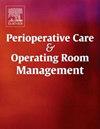Nurses' views on patient privacy in the operating room environment: Phenomenological research
IF 1
Q2 Nursing
Perioperative Care and Operating Room Management
Pub Date : 2025-07-21
DOI:10.1016/j.pcorm.2025.100532
引用次数: 0
Abstract
Aim
This study aims to evaluate the views of nurses working in the operating room regarding patient privacy.
Methods
The research is a qualitative study and phenomenological research was used. Data were collected through semi-structured interviews with 15 nurses working in the operating room unit of a university hospital in Central Anatolia between August and October 2024. The data were analyzed by content analysis method and categorized under the determined themes.
Results
When the qualitative data of the study were evaluated, 6 themes and 31 sub-themes were identified under the titles of “Definition of Privacy”, “Private Information”, “Violation of Privacy”, “Protection of Physical Privacy”, “Transfer Process” and “Suggestions on Protection of Privacy”. The study revealed that nurses associate patient privacy with elements such as personal information, the body, and the diagnosis and treatment process. It also indicated that nurses face various challenges in maintaining privacy during patient transfers and surgical preparation. Nurses emphasized that privacy is not only limited to physical privacy, but it is also important to protect personal information.
Conclusions
In the study, it was concluded that nurses care about patient privacy, but they cannot provide privacy at the desired level due to challenges such as workload, empathy gaps, teamwork problems and inadequate training. .
Implications for Clinical Practice
This study fills an important gap in clinical practice by revealing the current situation and challenges regarding the protection of patient privacy in the operating room environment. Violation of patient privacy can carry serious risks in terms of patient safety and ethical standards. The study provides important clinical recommendations to improve patient care quality and safety by emphasizing the need to strengthen ethical training for nurses and other healthcare professionals, to establish structured systems in operating room processes, and to increase communication within the team.
手术室环境中护士对患者隐私的看法:现象学研究
目的本研究旨在评估手术室护士对患者隐私的看法。方法采用质性研究和现象学研究相结合的方法。数据通过半结构化访谈收集,访谈对象为2024年8月至10月在安纳托利亚中部一所大学医院手术室工作的15名护士。采用内容分析法对数据进行分析,并根据确定的主题进行分类。结果在对研究的定性数据进行评估时,确定了“隐私的定义”、“私人信息”、“隐私的侵犯”、“实体隐私的保护”、“传输过程”和“隐私保护建议”等6个主题和31个子主题。研究显示,护士将患者隐私与个人信息、身体、诊断和治疗过程等因素联系在一起。它还表明,护士在病人转移和手术准备期间面临各种挑战,以保持隐私。护士们强调,隐私不仅仅局限于身体隐私,保护个人信息也很重要。结论本研究得出护士对患者隐私的关心,但由于工作量、共情差距、团队合作问题和培训不足等挑战,护士无法提供理想水平的隐私。临床实践启示本研究揭示了手术室环境中患者隐私保护的现状和挑战,填补了临床实践中的一个重要空白。侵犯患者隐私可能在患者安全和道德标准方面带来严重风险。该研究通过强调加强护士和其他医疗专业人员的道德培训,建立结构化的手术室流程系统,以及加强团队内部的沟通,为提高患者护理质量和安全提供了重要的临床建议。
本文章由计算机程序翻译,如有差异,请以英文原文为准。
求助全文
约1分钟内获得全文
求助全文
来源期刊

Perioperative Care and Operating Room Management
Nursing-Medical and Surgical Nursing
CiteScore
1.30
自引率
0.00%
发文量
52
审稿时长
56 days
期刊介绍:
The objective of this new online journal is to serve as a multidisciplinary, peer-reviewed source of information related to the administrative, economic, operational, safety, and quality aspects of the ambulatory and in-patient operating room and interventional procedural processes. The journal will provide high-quality information and research findings on operational and system-based approaches to ensure safe, coordinated, and high-value periprocedural care. With the current focus on value in health care it is essential that there is a venue for researchers to publish articles on quality improvement process initiatives, process flow modeling, information management, efficient design, cost improvement, use of novel technologies, and management.
 求助内容:
求助内容: 应助结果提醒方式:
应助结果提醒方式:


